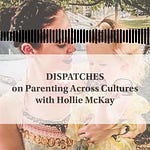“Cowards will always commit war crimes.”
― Anthony T. Hincks
Listening note: This episode includes additional audio track discussion of the challenges of war crimes investigation, conflicting viewpoints about Russia, and upcoming work by Hollie.
AS EVIDENCE OF WAR CRIMES MOUNTS, IT'S FAR FROM A SURE THING ANYONE WILL PAY THE PRICE
It’s the stuff of nightmares: hundreds of blistered corpses strewn across rubble streets, others tossed into mass graves with hands tied, crippled Russian tanks and armored vehicles decaying, hollowed homes and a scorched shell of the once lively small city on the fringes of the Ukrainian capital of Kyiv.
The searing images of Bucha released Sunday by the Ukrainian Defense Forces, who entered the previously Russian-occupied enclave after the enemy troops were forced to withdraw, paint a painful picture that many governments and analysts already pinpoint as akin to Kremlin-instituted war crimes.
As they say in the diplomatic world, the Ukrainian invasion – just over five weeks old – is fast becoming a “thick file” for such internationally-recognized violations, despite the chorus of condemnation and desperate pleas by world leaders for President Putin to put a stop to the unprovoked bloodletting.
In my interviews with the displaced fleeing the apocalyptic Bucha in recent weeks, every resident who fled recalled being fired upon by Russian troops as they tried to escape – a bullet hit one man in the hand. Another killed his German Shepard beside him. Evacuees spoke of arbitrary killings of those who dared to step outside their bomb shelters to collect mail, smoke a cigarette or even deliver bread to friends starving nearby.
When they eventually left their beloved homes, bodies of the dead strewn the gutters and sidewalks, and Russian soldiers forbade them to collect or even cover those they loved as a final act of respect.
“I saw my neighbor,” one man, an engineer named Igor, said. “And another young boy I knew, who looked like he was riding his bicycle when he was suddenly riddled with bullets.”
Those who remained weeks into the occupation, which began with bloody battles on February 24, recounted soldiers frequently and unlawfully entering homes and bomb shelters, stealing food, alcohol, electronics, medicine, and clothing from embattled residents.
The United States has officially declared that Russian soldiers have committed war crimes, highlighting the brutality against civilians, and emphasizing that it is also “a war crime to attack a nuclear plant,” which Moscow’s forces have done on multiple occasions. Russia also stands accused of bombing civilian hospitals – including a maternity hospital in the eastern city of Mariupol – and is suspected of using the globally-prohibited vacuum and cluster bombs in cramped areas where many civilians were seeking refuge.
“Since launching his unprovoked and unjust war of choice, Russian President Vladimir Putin has unleashed unrelenting violence that has caused death and destruction across Ukraine,” the U.S. State Department asserted. “Many of the sites Russia’s forces have hit have been identifiable as in-use by civilians. Every day that Russia’s forces continue their brutal attacks, the number of innocent civilians killed and wounded, including women and children, climbs.”
But what exactly are war crimes?
At their core, war crimes involve the notion that an individual can be held responsible for acts committed during a conflict in violation of international law. Furthermore, such crimes do not have a statute of limitations, so a person can still be prosecuted and punished regardless of how long has passed since the crime took place.
According to Article 8 of the 1998 Rome Statute of the International Criminal Court (ICC), which established a formal outline of what constitutes a “war crime,” actions that fit in this category are:
i. Willful killing
ii. Torture or inhuman treatment, including biological experiments;
iii. Willfully causing great suffering or serious injury to body or health;
iv. Extensive destruction and appropriation of property, not justified by military necessity and carried out unlawfully and wantonly;
v. Compelling a prisoner of war or other protected person to serve in the forces of a hostile Power;
vi. Willfully depriving a prisoner of war or other protected person of the rights of fair and regular trial;
vii. Unlawful deportation or transfer or unlawful confinement;
viii. Taking of hostages.
Such acts can be executed against both innocent civilians and combatants in the war theater. However, for the “war crimes” category to be used as part of the prosecution, the violations must have been committed during an armed conflict, and the conduct must have been carried out in pursuit of a combatant’s aim or wartime strategy. (I.e., if a homicide occurs during a war but is determined not to be related to the war itself, it is not classified as a war crime).
The act must also be deemed a severe violation of international humanitarian law to constitute a war crime. Such breaches do not enlist State responsibility but herald individual criminal responsibility, as individuals are personally held liable.
Thus, individuals can be held culpable for banned deeds, including murder, torture, taking hostages, pillaging, recruiting child soldiers, and intentionally directing assaults on civilians and civilian infrastructure, including hospitals, historical monuments, religious and educational institutions, and places devoted to the sciences and charitable causes. Human Rights Watch (HRW) has documented multiple incidences of war atrocities in occupied pockets, including Chernihiv, Kharkiv, Mariupol and Kyiv oblast areas – from looting civilian property to summary execution. Chillingly, numerous cases of sexual violence perpetrated by Russian foot soldiers are also starting to emerge from the ashes of broken towns and cities.
“On March 13, a Russian soldier beat and repeatedly raped Olha [not her real name], a 31-year-old woman in Malaya Rohan, a village in the Kharkiv region that Russian forces controlled,” HRW stated in its most recent report. At around midnight on March 13, a Russian soldier forcibly entered the school; Olha said: “He broke glass windows at the entrance to the school and banged on the door. A guard opened the door.”
According to the published anecdote, the soldier took Olha to a second-floor classroom where he “pointed a gun at her and told her to undress,” allegedly forcing the mother to perform oral sex at gunpoint and twice shooting at the ceiling as a word of warning before committing rape.
“The soldier told her to go to the basement and get her things so that she could stay in the classroom with him. She refused. “I knew my daughter would cry if she saw me,” she said. The soldier got a knife and told her to do so as he said if she wanted to see her child again,” the HRW report continues. “The soldier raped her again, put a knife to her throat and cut the skin on her neck. He also cut her cheek with the knife and cut off some of her hair. He hit her on the face with a book and repeatedly slapped her.”
Subsequent images dated March 19 and 20, show cut marks and bruising on her neck and face, HRW said.
Ukrainian President Volodymyr Zelensky has gone as far as incriminating Russia for carrying out the ultimate crime of genocide against a struggling population. Genocide is deemed the calculated attempt to decimate a national, ethnic, racial, or religious group. It was first termed by Jewish-Polish lawyer Raphael Lemkin in 1943, fusing the Greek word “genos” (race or tribe) with the Latin term “cide” (to kill).
Nevertheless, despite the jarring evidence of the torment unfurling on the blood-swathed Ukrainian grounds, of which Ukraine’s prosecutor general has already opened more than 2,500 cases, bringing forth any semblance of accountability in the International Criminal Court (ICC) is poised to be a rough and far from a guaranteed road.
CLICK TO READ MORE ABOUT THE LONG ROAD TO JUSTICE
WHAT COUNTRIES ARE STILL NOT CONDEMNING RUSSIA — AND WHY
More than a month ago, Moscow unleashed havoc on Ukraine with an unprovoked sea, air, and land invasion – igniting a kind of European conflict not seen since the Second World War. The U.S. and its western allies were quick to condemn and sanction Russia, yet some countries – including allies – have refused to join the chorus of criticism.
Late last week, the U.N. General Assembly adopted a nonbinding resolution insisting on protecting civilians and civilian infrastructure in Ukraine and demanding an immediate end to the hostilities. However, while the resolution received the green light from 140 of the 193-member assembly, it leaves fifty-three members unaccounted for – four voted against the adoption, thirty-eight abstained. The remainder were absent from the vote.
Moscow allies Syria, Belarus, and North Korea (and Russia itself) voted down the resolution, as did Eritrea, even in the face of U.N. Secretary-General Antonio Guterres assailing Russia’s aggression as “absurd,” given that more than four million have been forced to flee to neighboring nations while countless civilians have been slaughtered in the bombing and blistering.
The Horn of Africa nation typically stays out of foreign dilemmas. But, at the same time, the other three have been vocal in blaming NATO expansion as the instigator of the fighting rather than President Putin.
“Eretria’s government faces sanctions from the West due to repressive activities. Yet, it’s doing the things Russia is doing in Ukraine to its own people,” notes global risk analyst Dennis Santiago. “Showing solidarity with Mr. Putin’s coldness and brutality should only serve as notice to the world that even stronger sanctions should be imposed on Eretria.”
Venezuela has backed the Kremlin in its statements, although it was absent from voting along with Azerbaijan, Burkina Faso, Eswatini, Ethiopia, Guinea, Guinea-Bassau, Morocco, Togo, Turkmenistan, and Uzbekistan.
The outcome of the vote parallels the same results as the resolution put forward in the U.N. on March 2, scolding Russia for waging war on Ukraine.
However, the world’s so-called largest democracy, India, remains mum on chiding the Kremlin’s atrocities – raising questions over how and why the country (which has received around $2.4 billion in U.S. aid since 2009) declines to take Washington’s side.
For those interested in learning more about the aftermath of war, please pick up a copy of my latest book “Only Cry for the Living: Memos from Inside the ISIS Battlefield.”
If you want to support small business:
And also now available Down Under!
My new coffee table book with the amazing photographer @JakeSimkinPhotos is additionally available for pre-order, slated for release later this Spring: Afghanistan: The End of the US Footprint and the Rise of the Taliban Rule
Thanks again for your support. Follow me on Instagram and Twitter for more updates. Please consider a paid subscription to help me continue to do this work.



















Share this post